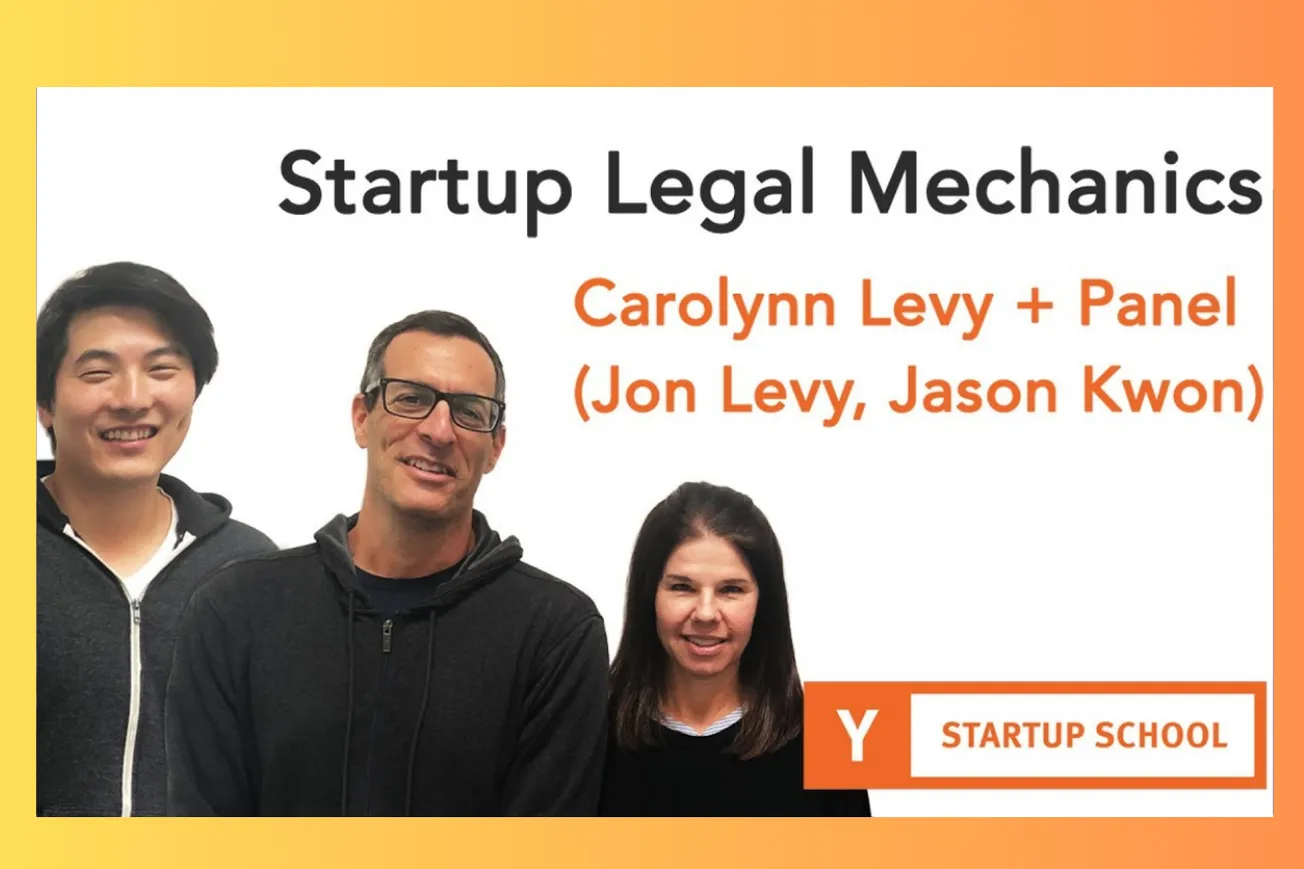Table of Contents
Y Combinator's legal experts reveal the critical legal steps every founder must take, from incorporation to avoiding costly mistakes that can kill startups.
Key Takeaways
- Incorporate in Delaware using platforms like Clerke or Stripe Atlas rather than expensive lawyers, as these specialized services outperform generalist attorneys
- Founder stock must include vesting schedules even for solo founders, as investors will never fund companies where founders can leave with full equity overnight
- File 83(b) tax elections within 30 days of buying founder stock—missing this deadline creates potentially devastating tax liabilities that cannot be easily fixed
- Keep all legal documents in shared storage (not individual email accounts) with signed, dated versions to avoid looking amateur during investor due diligence
- Never work with strangers as co-founders, and resolve founder conflicts immediately rather than hoping relationships will improve over time
- LLCs should be avoided for venture-backed startups since most professional investors refuse to invest in limited liability companies
- Unpaid employees create legal liability—use contractors or consultants instead, but ensure proper classification under increasingly strict California regulations
- Trademark disputes should be resolved by changing names rather than engaging in expensive legal battles that distract from building the business
- Employment relationships require confidentiality and intellectual property assignment agreements (CIIAs) to protect company-owned innovations and trade secrets
Timeline Overview
- Introduction — Jeff introduces Carolyn Levy, John Levy, and Jason Kwon as the finest legal minds in startup law, emphasizing their extensive experience with YC companies
- Incorporation fundamentals — Delaware corporation formation using online platforms, post-incorporation steps including board formation and corporate bank accounts
- Founder stock mechanics — Equal equity splits, restricted stock purchase agreements, vesting schedules, and the critical importance of 83(b) tax elections
- Employment considerations — Founder employment status, minimum wage requirements, CIIA agreements, and avoiding unpaid intern legal violations
- Common mistakes analysis — Timing incorporation decisions, LLC versus corporation choice, lawyer necessity, and maintaining full-time job complications
- Founder relationship issues — Vesting importance for all founders, legal document comprehension, equity-only compensation problems, and co-founder breakup management
- Employee stock plans — When to implement equity compensation, 409A valuations, restricted stock versus options, and early employee grant timing
- Trademark and naming — Responding to cease and desist letters, domain purchase decisions, and trademark registration priorities
- Q&A session — 83(b) elections, immigration issues, C-corp versus S-corp elections, equity allocation, employment classification, and international considerations
Delaware Incorporation: The Foundation of Startup Success
Every startup should incorporate as a Delaware corporation using specialized online platforms rather than traditional lawyers, as this approach provides faster, cheaper, and often superior results for standard startup formations.
- Delaware offers the most efficient incorporation process with fast service and well-established corporate law that most public companies use
- Some investors require Delaware incorporation before funding, making early state selection critical for future fundraising flexibility
- Clerke and Stripe Atlas represent the gold standard for startup incorporation platforms because they provide post-incorporation documents and ongoing support
- Traditional lawyers often cost significantly more while delivering inferior results for standard incorporations, unless the startup has unusual complexity
- Even family members who practice law may provide worse service than specialized platforms if they lack corporate transactional experience
- The certificate of incorporation filing process is simple and short for startups, requiring minimal customization beyond basic corporate structure
Online platforms eliminate the need for expensive legal counsel during formation while ensuring all necessary steps are completed properly.
Founder Stock and Vesting: Protecting Against Inevitable Changes
All founders must purchase restricted stock with four-year vesting schedules, regardless of team size or relationship history, as this protection becomes essential when team dynamics change or investors evaluate the company.
- Equal equity splits work best when all founders will contribute equally to future execution, since past idea generation matters less than upcoming work
- Founders must actually purchase their shares using stock purchase agreements, typically paying nominal cash plus contributing any existing intellectual property
- Vesting prevents founders from leaving with full equity stakes, protecting remaining team members and making the company attractive to investors
- Even solo founders should implement vesting because they will eventually hire employees with vested equity, and leading by example creates better culture
- Four-year vesting represents the standard timeframe that investors expect, with one-year cliffs common to prevent very short-term departures
- Companies that skip vesting face expensive and complex fixes later, especially if stock prices have increased significantly since formation
The "our team has worked together for years" argument against vesting consistently proves incorrect when business pressures create unexpected founder conflicts.
The 83(b) Election: A Critical Tax Decision
Filing 83(b) tax elections within 30 days of purchasing founder stock represents one of the most important and time-sensitive legal requirements for startup founders.
- The 83(b) election allows founders to pay taxes on restricted stock based on purchase price rather than vesting-date values
- Missing the 30-day deadline creates potentially massive tax liabilities as the company grows in value and stock vests over time
- The deadline includes calendar days (not business days) and starts from the actual stock purchase date, requiring careful attention to timing
- Both individual founders and the company must retain signed, dated copies of 83(b) elections for tax purposes and investor due diligence
- Failed 83(b) elections can sometimes be mitigated through expensive tax planning, but prevention through timely filing is always preferable
- This represents one of the few startup legal mistakes that cannot be easily corrected after the fact
Investors specifically look for proper 83(b) elections during due diligence, making this a critical credibility factor for fundraising success.
Employment and Compensation: Avoiding Legal Pitfalls
Startup founders and employees must be properly classified and compensated to avoid legal violations, even when cash flow is limited.
- Founders should pay themselves minimum wage when the company has sufficient funds, as failure to pay wages technically violates labor laws
- Employment agreements are unnecessary and potentially harmful for startups, as at-will employment provides more flexibility for necessary terminations
- All workers must sign confidentiality and intellectual property assignment agreements (CIIAs) to ensure the company owns all created innovations
- Unpaid interns create significant legal liability under federal and state labor laws, with limited exceptions for academic credit programs
- Independent contractors must meet strict classification requirements that became more stringent under recent California Supreme Court rulings
- Early employees should receive restricted stock rather than stock options to avoid 409A valuation requirements before fundraising events
Proper employment practices prevent legal complications that can become expensive distractions during critical company growth periods.
Common Incorporation Mistakes: Learning from Others' Errors
Understanding frequent founder mistakes helps new entrepreneurs avoid time-consuming and expensive legal problems that can derail startup progress.
- LLCs should be avoided for venture-backed startups because most professional investors refuse to invest in limited liability company structures
- Incorporating sooner rather than later provides liability protection, intellectual property ownership clarity, and fundraising capability
- Working on startups while maintaining full-time employment requires careful separation of activities, equipment, and timing to avoid employer claims
- Expensive domain purchases and trademark disputes should be avoided in favor of simpler naming solutions that enable focus on product development
- Legal document comprehension is essential, particularly for founder stock agreements and fundraising documents like SAFEs
- Equity-only compensation for non-founder workers creates legal classification problems that require careful contractor versus employee analysis
These mistakes typically stem from founders trying to optimize minor details while neglecting more important business fundamentals.
Founder Relationship Management: Preventing Team Implosion
Founder conflicts represent one of the most common causes of startup failure, making proper legal structure and early conflict resolution essential for company survival.
- Never work with strangers as co-founders, as even close relationships can deteriorate under startup stress
- Founder breakups should be resolved immediately rather than hoping relationships will improve over time
- Proper vesting, employment status, and IP assignment provide legal frameworks that minimize breakup complications
- The emotional aspects of founder conflicts cannot be completely prevented, but legal structure reduces associated business damage
- Brothers and close friends have broken up as co-founders, proving that prior relationships don't guarantee startup compatibility
- Clear equity allocation processes reveal underlying trust and commitment issues that may indicate fundamental team problems
Early legal planning cannot prevent all founder conflicts but can significantly reduce their business impact when they occur.
Employee Equity and Growth Planning: Scaling Team Ownership
Growing startups must implement proper equity compensation systems for employees while managing tax implications and maintaining founder control.
- Stock incentive plans typically allocate 10-20% of company shares for employee grants, depending on hiring needs and growth stages
- Restricted stock grants work better than stock options for early employees because they avoid 409A valuation requirements
- Employee equity should be granted as early as possible when stock prices are low, making the grants more valuable and motivating
- Stock option plans require 15-20 page documents due to complex tax and securities regulations governing employee equity
- 409A valuations become necessary for stock option grants but not restricted stock, influencing equity compensation timing decisions
- Generous employee equity policies help retain key talent and align team incentives with long-term company success
Properly structured employee equity programs attract better talent while avoiding regulatory complications that can slow company growth.
Trademark and Intellectual Property: Practical Protection Strategies
Startups should focus on practical intellectual property protection that supports business growth rather than comprehensive legal coverage that drains resources.
- Cease and desist letters should typically result in name changes rather than expensive trademark disputes with better-funded companies
- Trademark registration represents a "nice to have" rather than essential early-stage expense for most startups
- Patent applications matter more for life sciences companies than software startups, where execution speed typically matters more than IP protection
- Domain purchases should be economical rather than expensive, as great names don't justify significant financial investments for early-stage companies
- No company successfully raises money based solely on patent portfolios—execution capability always matters more than IP protection
- Research potential trademark conflicts before choosing names, but don't over-invest in comprehensive legal clearance processes
Intellectual property protection should support business objectives rather than becoming an end in itself that distracts from customer acquisition.
Document Management and Investor Readiness: Professional Standards
Proper legal document organization and maintenance creates credibility with investors while preventing embarrassing due diligence problems.
- Store all legal documents in shared locations like Dropbox rather than individual email accounts to ensure access continuity
- Ensure all documents are properly signed and dated with no blank fields, as incomplete paperwork appears amateur during fundraising
- Maintain copies of critical documents like 83(b) elections, incorporation papers, and IP assignment agreements indefinitely
- Corporate tax obligations include Delaware annual taxes and federal returns, even when no taxes are owed
- Payroll tax requirements apply when founders receive minimum wage, necessitating professional payroll service setup
- Professional document management habits established early scale naturally as companies grow and face more complex legal requirements
Investors judge company professionalism partly through legal document quality, making proper maintenance a competitive advantage during fundraising.
Y Combinator's legal framework provides a comprehensive roadmap for startup founders to establish proper legal foundations while avoiding common mistakes that can destroy promising companies. Following these guidelines creates the professional structure necessary for scaling businesses and attracting institutional investment.





